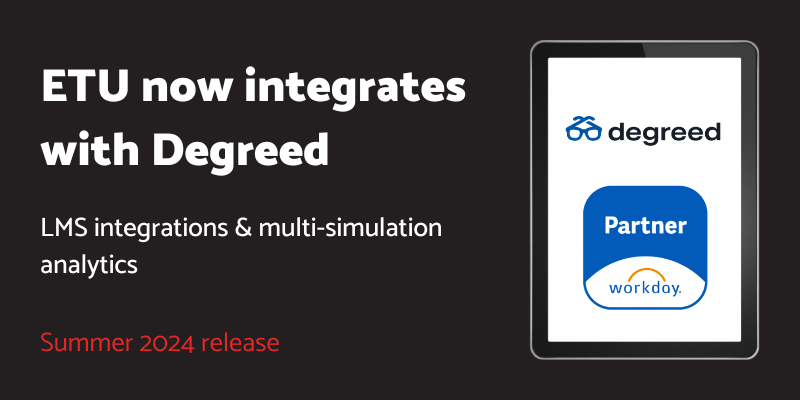ETU now integrates with Degreed - Summer 2024 Release

ETU is excited to announce two platform features within our latest product release:
1. Seamless integration with Degreed
ETU now integrates seamlessly with Degreed as the first step in our full-integration plan with all major LMS/LXP platforms. Break down the silos between L&D and Talent, provide a single integrated source for learner analytics, and get full data visibility without having to leave the LMS/LXP.
2. Multi-simulation analytics
You asked. We listened! You’ll now be able to add up to 20 different simulations into an auto insights report – then switch between multiple views of learner data.
These advancements were made so you can get a deeper, richer understanding of learners’ performance across multiple ETU sims, giving you new insights into skill performance over time and in varied scenarios.
Using these features to drive business impact
Our new Degreed integration is the first of many LMS/LXP collaborations on the product roadmap. Degreed users can effortlessly create, perform, and verify ETU simulation completions within their Degreed instance. This will soon be available inside Workday and many other platforms.
When paired with the new multi-simulation analytics, you’ll be able to drive organizational change and results faster. Here are some of the direct applications of the features:
- Build efficiency through a unified ecosystem: Integration into Degreed and other LMS/LXP systems will allow easier access to skills data and flexibility in upskilling programs.
- Make decisions with better data: New multi-simulation analytics let you view learner data in many forms, compiled from up to 20 simulations at once. This unlocks the ability to make quick and easy decisions – whether it’s about reducing costs, mitigating risks, or increasing revenue and efficiency.
- Personalized learner journeys: As your plans for talent and development expand, so does our technology. ETU’s Degreed integration and multi-simulation analytics were designed to enhance the power of skills data reporting, seamlessly tied into your workflows and systems.
Technical rundown of the new features
What will be available in Degreed?
- Highly personalized learning pathways: Ensuring employees receive the most relevant content focused on addressing skills gaps rather than strengths.
- Unique learn-while-doing experiences: Powered by ETU's simulation platform, these experiences enhance engagement and retention.
- Special learner insights: Providing deeper understanding and actionable insights into learner performance and engagement.
- Verified skills data: Enabling more informed HR and Talent conversations through verified skills data.
How do multi-simulation analytics work?
To offer a deeper and richer understanding of simulations and learner performance, ETU now supports the inclusion of up to 20 simulations in an auto insights report. This capability provides several key benefits:
- Comprehensive data analysis: Stakeholders can now analyze learner data from up to 20 different simulations, providing a holistic view of performance and engagement.
- Customizable reports: Users can easily configure reports by identifying and ordering simulations through a simple drag-and-drop interface.
- Diverse visualizations: The new catalog allows stakeholders to display learner data using various visualizations, such as engagement metrics, pass rates, average time spent, practice mode summaries, and more.

